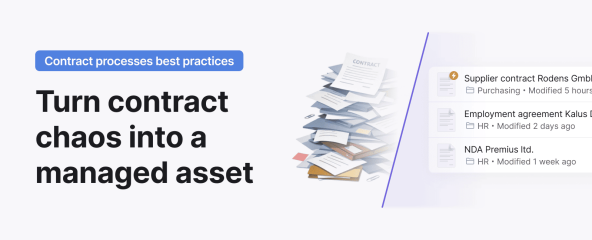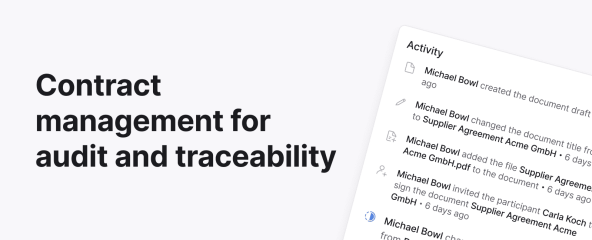
Streamline your deal flow — make due diligence a breeze.
You’re preparing to sell a property and want to share the master file and all relevant real estate documents for the upcoming due diligence?
With Inhubber, managing your deal flow is effortless.
But first, let’s take a closer look at what’s included in the master file.
The master file – the guardian of all documents
Founding documents
The master file should contain all company-related records, including the founding documents — for example, the certificate of incorporation, the shareholders’ agreement, and the commercial register entry.
Tax documents
Once you’ve purchased a property, you’ll receive correspondence from the tax office. The relevant tax assessments also belong in the master file — such as the real estate transfer tax notice, as well as corporate and trade tax assessments.
Accounting and financial documents
Always remember to include the following accounting and financial documents in the master file. The opening balance sheet is especially important, as it proves that the share capital has been paid in, either in full or in part. Also attach all account-opening documents so you’re aware of your banking conditions. Of course, access details for online banking or any debit/credit cards should be stored separately.
The file should also contain any bank powers of attorney you’ve granted — this allows you to keep track of who has access to the account and to what extent. For example, some employees may only have viewing rights, while others can make transfers within specific daily or monthly limits. This can quickly become complex, especially if employees have differentiated access and the property management company also needs several separate authorizations for rent administration or accounts payable/receivable accounting. Naturally, the annual financial statements should also be included in the master file.
Service contracts
If you’ve hired a property management company to oversee your property, the management contract must also be included in the master file. If you rent out commercial or residential space and have appointed a real estate agency, the brokerage agreement also belongs in the file.
Property documents
There’s no shortage of documents related to a property. The purchase contract must be included in the master file, along with floor plans and architectural designs. To prove ownership, the land register extract is also essential. If construction plans were submitted to and approved by the building authority, the building permit should also be filed. An up-to-date tenant list, as well as relevant insurance policies — such as homeowner’s liability and building insurance — should also be stored in the master file.
These lists are not exhaustive but are meant to give you an idea of how extensive a master file can be.
Excluded here, for example, are rental agreements for residential or commercial spaces and utility contracts for water, electricity, and waste disposal.
The scope of such a master file — and the ongoing maintenance of its documents, especially numerous contracts — is, of course, much easier to manage digitally than on paper. A data room with countless subfolders is often standard practice, which easily leads to filing errors and misplaced documents — a critical issue during due diligence.
In our blog article, you’ll learn how Inhubber simplifies file organization with smart labels.
Now, let’s show you how Inhubber simplifies your deal flow in five clear steps — saving you valuable resources such as time and money.
Step 1: Upload the documents to the platform
All company and property documents are uploaded to the blockchain-secured platform and tagged with the appropriate labels. Artificial intelligence can even handle this step for you automatically.
Learn more in our blog article: How digital is the construction industry? What are the benefits? Is digital contract management complicated?
Step 2: Share the documents with your contract partner
With Inhubber, sharing documents with your contract partner is simple.
You can easily create a shared workspace where both parties have access to the uploaded documents. You decide the access rights — whether read-only, editing, or signing permissions.
Because the platform is powered by blockchain technology, every action — such as viewing or downloading a document — is securely recorded and cannot be manipulated.
In the event of a dispute, this provides clear, verifiable proof of which documents were shared and accessed.
This creates security, trust, and transparency between all parties involved.
Step 3: Have important deal flow documents digitally signed
Inhubber uses blockchain not only to encrypt contracts but also to enable legally binding and tamper-proof digital signatures for any file format — including PDF, JPEG, WAV, XLS, DOC, and ODT.
Your business partner wants a tenant list that only exists in Excel format? Perfect — share it and have the receipt and approval confirmed with a digital signature.
Step 4: After due diligence comes the draft purchase agreement
Once the due diligence process is complete, a purchase agreement is prepared.
Depending on the size and complexity of the deal, this contract may span several hundred pages. It must then be reviewed, and all relevant dates and deadlines recorded.
Here, Inhubber’s artificial intelligence can assist you efficiently.
Step 5: Artificial intelligence as your digital assistant
Inhubber’s AI analyzes key dates and deadlines directly from the purchase contract and presents them in a clear overview.
You can jump to any specific date or clause instantly, as these are highlighted directly within the contract.
The AI automatically creates reminders so that no deadline or milestone is missed.
These reminders can be shared via Microsoft SharePoint, and you’ll receive timely notifications by email.
This way, you always keep essential bullet points in sight — without manually extracting or tracking every clause yourself.
Deal type 1: The share deal
The share deal is a popular transaction model in the real estate sector. In this case, the property itself is not purchased directly; instead, the buyer acquires the company that holds the property as a fixed asset.
This company is often referred to as a property-holding company because it owns only the property and conducts no other business activities.
The share deal is attractive because it allows the buyer to avoid paying real estate transfer tax, which varies between German federal states — for example, it is 6% of the purchase price in Berlin.
This tax advantage is often reflected in the seller’s asking price, which tends to be slightly higher compared to an asset deal.
However, since July 1, 2021, new legal regulations apply to share deals.
The amendments to the Real Estate Transfer Tax Act (GrEStG) reduced the threshold for triggering transfer tax from 95% to 90% ownership of the property-holding company.
This means the transfer tax can only be avoided if the buyer acquires no more than 90% of the shares in the company.
At the same time, the holding period for the minority shareholder has been extended from five to ten years.
As a result, the transfer tax becomes due if the minority shareholder acquires more than 90% of the shares within ten years.
Deal type 2: The asset deal
In an asset deal, the buyer acquires the property directly and in full ownership.
Unlike in a share deal, no company shares are purchased.
The buyer becomes the immediate owner of the property upon transfer of ownership rights (“Übergang von Nutzen und Lasten”).
This transaction, however, triggers real estate transfer tax once again.





